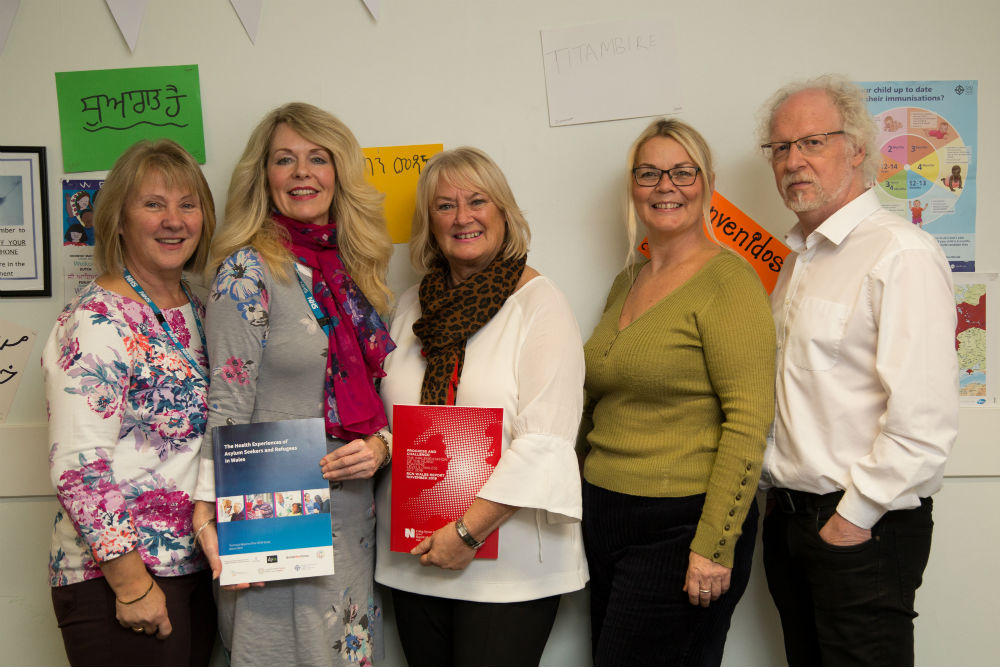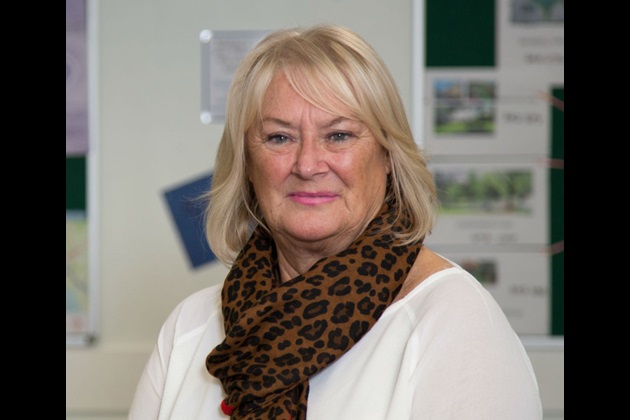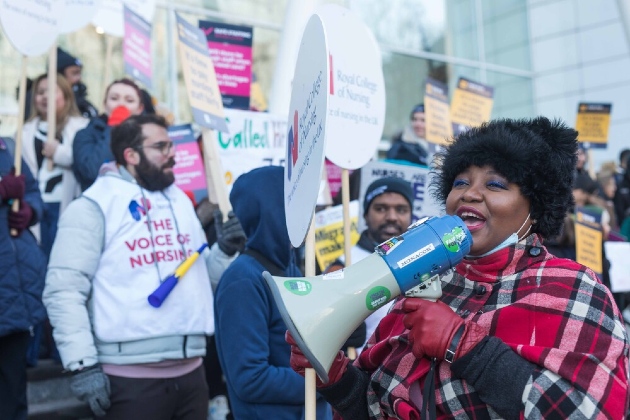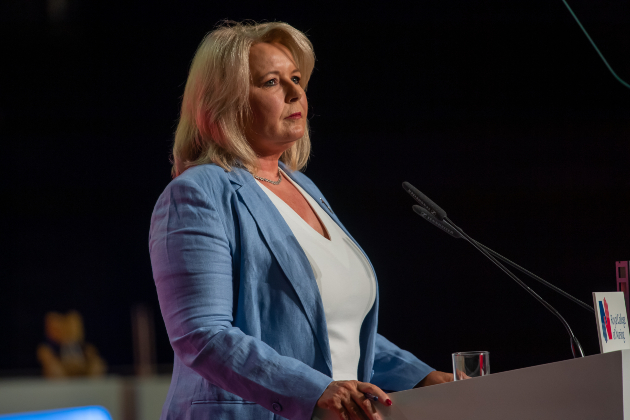Jean’s been recognised for her work raising the profile and plight of people seeking asylum as she fights for equality in their care
At the age of 10, Jean Saunders left the UK with her family to go to Australia. She remembers clearly that she didn’t want to leave. She was especially upset about saying goodbye to her friends and other family members, including her grandmother.
“I always consider this when I see frightened young asylum seekers,” she says. “Even though our move was planned I can understand, to some extent, what some of them might be thinking and I always try to take on board their feelings, even if they can’t articulate them to me.”
As the lead in the Health Access Team at Swansea Bay University Health Board, Jean’s there to provide support right from the start.
As soon as individuals and families seeking asylum arrive in the Swansea area, they’re sent an appointment for a health assessment with her team. These are not compulsory, but the team do everything they can to encourage people to attend, and always make contact to see families with children and pregnant women. All the children they see have their health and development assessed and under-fives are then referred to the appropriate health visitor.
The health assessments, which take between one and three hours, are a chance for the team to give advice and treatment. The team make appropriate referrals to relevant health services, and to local support services and give practical advice, with language barriers taken into account.
I always try to take on board their feelings, even if they can’t articulate them to me
People seeking asylum may find it difficult to access local services, so Jean and the team have developed several resources to reduce barriers to accessing care, for example adding a photograph and a map of the clinic to appointment letters. They also provide clients with maps of how to get to their allocated GP and support services in the city and other pictorial resources.
“Due to the ad hoc nature of our work it’s not practical to use face-to-face interpreters so we use an interpreting and translation service called Language Line to communicate with clients. A lot of our UK processes will be unfamiliar, so we help by making sure people are registered with a local GP as a starting point,” Jean explains. “We’re health visitors but we don’t just see families. In fact, we mostly see single people. Their ages range from zero to 99 years old.”
Immunisations
The team also provides an important public health service, offering adults and children over five immunisations to ensure they are in line with the UK schedule.
“Unless clients decline, we always offer immunisations from scratch, to ensure children and adults are fully protected. Many parents say their children have had immunisations. However, while the World Health Organization provides current immunisations schedules, it does not provide the schedule for when they would have received the immunisations.”
In addition to immunisations, the team undertake Tuberculosis screening in accordance with the All Wales TB screening guidance, and provide health promotion help and advice.
The team’s work doesn’t end with the assessment either. They also offer open access appointments on weekdays.
“In theory, they’re for people seeking asylum but some refugees still pop in because they know they can trust us. Other colleagues and partners contact us for advice and support too,” Jean says.
Local partnerships
Jean is proud that Swansea was the first ever city of sanctuary in Wales, and the second in the UK, so being able to refer people to help elsewhere is central to her work. She says a strong, collaborative approach is essential to ensure people seeking asylum have every opportunity to address their health and wellbeing needs.
“Our local partners in the third sector are absolutely invaluable. We work with several agencies and have long-established relationships with them,” she says.
“We pride ourselves on giving clients the tools they need to access health care, taking a ‘how to’ not ‘do for’ approach. We also signpost them to other relevant local services, like the befriending service that helps clients settle into the area. The befriending service tailors the support to each client’s individual needs.”
Jean has also developed a joint assessment pathway with the Looked After Children health team to ensure the needs of unaccompanied asylum seekers children (UASC) are met.
“It’s far more beneficial for the young person if the teams collaborate and bring together their expertise. It reduces the stress for the young person and avoids duplicating work,” she says.
The team also ensures that the young person is immunised and receives a TB screening.
Society is becoming more tolerant but there’s still a lot of misconception
Modern-day slavery
In the 15 years she’s been working in the team, Jean’s developed a special insight into some of the unique challenges facing people seeking asylum.
“Society is becoming more tolerant but there’s still a lot of misconception,” she says. “However, there is so much to consider when first meeting someone seeking asylum. It’s important not to just accept what’s presented to you where you have concerns about the information that’s been shared – I’m more aware of the different aspects of modern-day slavery.
“So many of our clients are exploited – we’ve had to learn to pick up the signs as we’ve developed our skills and grown into our roles. Safeguarding is an enormous part of our role. We have a duty to ensure that any safeguarding concerns are acted upon.”
Jean’s quick to stress that she doesn’t work in isolation. Her team – a community nurse, two health visitors and an administrator – all work in one office and they are very close. They all need finely tuned observation and communication skills, as well as health promotion skills and the ability to keep up-to-date with Home Office policy.

“We often have to support clients who have suffered terrible ordeals in their home countries such as rape, torture and imprisonment. Some may also have been trafficked into the country. These issues are very emotive and can be extremely draining for the team members. We support each other and have a debrief every day,” she says.
And what impact does this have on individuals? One of the many asylum seekers whose life was changed by Jean, told the RCN: “I ran away to find freedom, to a country I did not know and a system I did not understand. You need someone like Jean to guide and help you. Wales is my home now. Thank you.”
Recognising care and dedication
Last month Jean was named the RCN Wales Nurse of the Year 2019. But she remains modest.
“This is not just about me,” she says. “It is a fantastic job; it’s very diverse, exhausting, rewarding and heart-lifting. The service can make a real difference to the people who use it, helping them get the health care and advice they need. I’m the voice, the advocate for a brilliant team which is working so hard to help asylum seekers in Swansea Bay. I feel privileged to be part of such a unique service.”
Find out more about Jean's award.
Further information
How do asylum seekers get to Swansea?
Individuals and families are initially screened by the Home Office before being sent to dispersal areas across the UK. Generally, in Wales they go to Cardiff first before being sent to permanent accommodation. When people are seen by Jean’s team, they may have only been in the UK for three weeks, although it could be longer.
About asylum seekers and refugees
-
Almost all asylum seekers are not allowed to work and are provided with an allowance of £37.75 per week.
-
According to the Refugee Council, the UK is home to approximately 1% of the 25.9 million refugees, forcibly displaced across the world. Half of refugees across the world are children.
Find out more
Access RCN resources on inclusion health care.
Words by Sharon Palfrey / Pictures by Stuart Fisher








